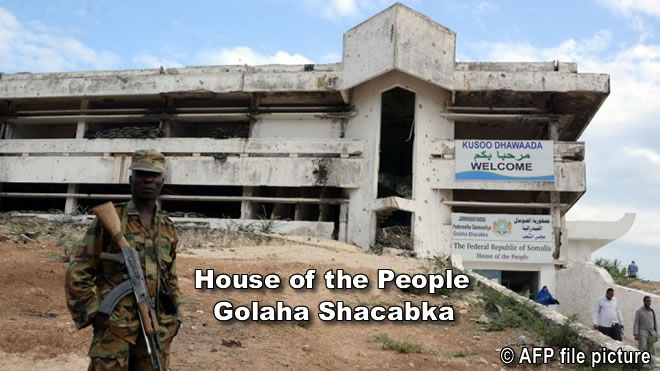
Hiiraan Online - Ku aqriso Af-Soomaali
Wednesday, September 7, 2016
MOGADISHU (HOL) – Attending parliamentary sessions is critical for fulfilling the representation and oversight mandate of parliamentarians in any country. For Somalia, attendance is even more crucial as parliament sessions set the national tone for rebuilding a state that has collapsed completely and representing the collective interest of a broken society savaged by civil war. An analysis by HOL on the attendance of Somalia’s 9th parliament (2012-2016) - found that this national calling has fallen on the deaf ears of many parliamentarians as dodging parliamentary sessions with impunity has become a standard practice.
The attendance sheet posted on the website of the parliament demonstrates that absenteeism ranges from 3% - 94%.
As demonstrated in the sessional statistics, many of the country’s lawmakers missed almost all sessions convened by parliament since it was formed in 2012. Most of the MPs who failed to appear in parliament missed sessions without bothering to seek formal permission.
With no bill that allows the dismissal of lawmakers who routinely missed sessions, Somalia’s leadership was left to give empty warnings against ‘unjustifiable’ absences by members of the legislative body; all cases went unpunished.
The 10 parliamentarians with worsts attendance record are:
|
NAMES OF MPS |
ATTENDANCE % |
|
1. Dr. Mohamed Aden Waaberi |
6% |
|
2. Abdirahman Mohamud Hussein |
8% |
|
3. Abdinasir Mohamed Abdulle |
11% |
|
4. Abshir Hassan Abshir |
14% |
|
5. Zakarie Hussein Arreh |
20% |
|
6. Asha Hagi Elmi |
24% |
|
7. Said Abdullahi Mohamed |
27% |
|
8. Abdulkadir Hassan Sheikh Aden |
28% |
|
9. Farah Sheikh Abdulkadir |
31% |
|
10. Fowsiya Mohamed Sheikh |
33% |
Source: Federal Republic of Somalia - House of the People, Office of the WHIPs
Note: MP ministers are not obliged to attend parliament sessions
The 10 parliamentarians with the best attendance record are:
|
NAMES OF THE MPs |
ATTENDANCE % |
|
1. Ali Hassan Guyow |
97% |
|
2. Abdullahi Ahmed Hussein |
96% |
|
3. Bishar Abdi Dirie |
95% |
|
4. Said Hassan Gedi |
95% |
|
5. Mohamed Abdulle Farah |
94% |
|
6. Aden Mohamed Ali |
94% |
|
7. Ahmed Mayow Abdulle |
93% |
|
8. Awais Abdullahi Ibrahim |
93% |
|
9. Habiba Mohamed Kheir |
93% |
|
10. Mayow Mustafa Hassan |
93% |
Source: Federal Republic of Somalia - House of the People, Office of the WHIPs
Absenteeism has affected the functioning of the parliament as many parliamentarians failed to attend the 348 regular and extraordinary sessions held over the 4-year term of the 9th parliament. In the past, sessions have been cancelled or postponed for lack of the required quorum.
The frequent absence by some Parliamentarians not only frustrates the constituents the MP’s represent but also draws the ire of their punctual colleagues. “We are talking about months of absence, even at times a year or a bit close to that.” said one Somali legislator who requested not be named. “It makes it near impossible to get anything done”.
An analysis of the attendance sheets suggests that some of the parliamentarians attended only extraordinary sessions, which are often held when sensitive motions such as vote of no confidence is tabled against the government. A political analyst we spoke to said “attendance of extraordinary session might suggest the importance parliamentarians attach to issues of national importance or it might signal the desire of parliamentarians to mint money from the motions”.
Insecurity is seen as one of the key factors contributing to the habitual absences by MP’s. Al Shabaab militants regularly target lawmakers as they congregate throughout Mogadishu. On June 1, two members of parliament were among the 16 killed in bomb and gun attacks at Hotel Ambassador in Mogadishu. In late April, two other Somali lawmakers narrowly escaped targeted assassinations in separate attacks that wounded their security guards. Sadly, such occurrences are common performing one of the most dangerous jobs in Somalia. Since 2012, 18 MPs have been killed.
Parliamentarians are scheduled to be elected between September 24 and October 10th, while the presidential elections will take place on October 30, according to the UN-backed Federal Indirect Electoral Implementation Team (FIEIT). Far from a one-person one-vote system as previously hoped for, 14,000 people from all federal states will choose the 275 members of parliament. Although it is not what Somali’s were promised it is still seen as a tangible improvement from the 135 elders who selected the current parliament in 2012. Many are hoping that a more inclusive system could produce more punctual MPs.
Read full details of MP attendance of 9th Parliament (2012 -2016)